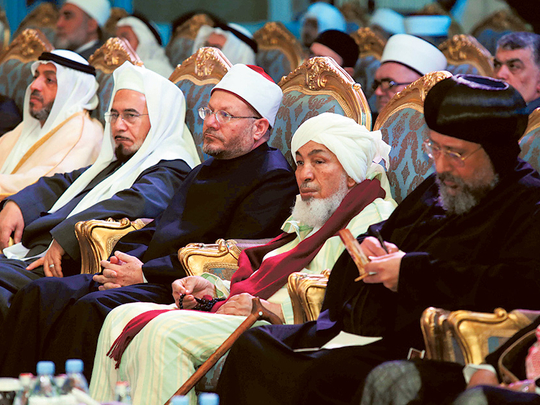
Abu Dhabi: Violence carried out by Muslim extremists, and conflicts involving Muslims in general, are neither unique, nor have they have left a higher toll than conflicts involving other groups, said Islamic scholar Hamza Yousuf on the second day of the Forum for Promoting Peace in Muslim Societies in Abu Dhabi.
Yousuf, an American who embraced Islam, displayed statistics compiled from historical and current sources, comparing the death toll as a result of Muslim-related conflict with other groups. The aim was to dispel the commonly held view that Muslims are more prone to violence than other groups.
“Are Muslims distinctive in their violence? Are they violent by nature? Does Islam make them this way? Studies have shown that the proportion of violence in stable Islamic communities is actually less than in Western countries,” Yousuf said.
Recounting his own experiences, Yousuf said that when he lived in Muslim countries like Morocco and the UAE, he felt safer than when he was in his own country, the United States. “I have lived in Morocco among the Bedouin, and in Al Ain, UAE, and I have never felt afraid. In America, there some places near my home that I am afraid to go because of the violence and crime.”
He pointed to the statistics that showed that Muslims accounted for just over 6 per cent in total of all casualties related to conflicts since the 14th century, and that Muslims overall came in second last in terms of the violence carried out compared to other religious and non-religious groups since then.
He also pointed to the tolerance in the Muslim world, showing images of churches that have been in the Middle East for centuries, such as in Syria and Egypt. According to Yousuf, groups like Daesh and others that mistreat minorities have nothing to do with Islam. “Injustice against minorities does not come from Islam, but from people who have violated the religion. Islam calls for the defence of other peoples and religions, and to defend their rights and freedom.”
Dr Amhand Idir Mechnane, Adviser to the Minister of Religious Affairs in Algeria, touched on the issue of Muslim extremists and the violence they carry out in the name of Islam, saying the extremists had a warped view of the Islamic concept of jihad.
“Jihad has been decreed to defend against aggression, and not to destroy non-Muslims. The concept of jihad forms the defensive system of every nation and state. Every nation needs to have a defensive system and nobody differs on this. If a nation or state came under aggression, its sons would be ready to defend the homeland,” he said.
He added, “Despite this clarity, we find young people who misunderstand Jihad, and the question we should ask ourselves is how can we protect our sons from this serious misunderstood Jihad? Statistics show there are an increasing number of young people joining extremist groups, and they are being used and exploited.”
Strengthening and merging the national identity with religion, according to Dr Mechnane, is one effective way to counter extremists, so that one’s nationality and religion are not seen as being mutually exclusive, a rhetoric often used by extremist groups.
“We need to merge religious and national discourse, to make these two faces of one coin. One is religion, the other is homeland, and no coin can be of one face [only],” he said.












